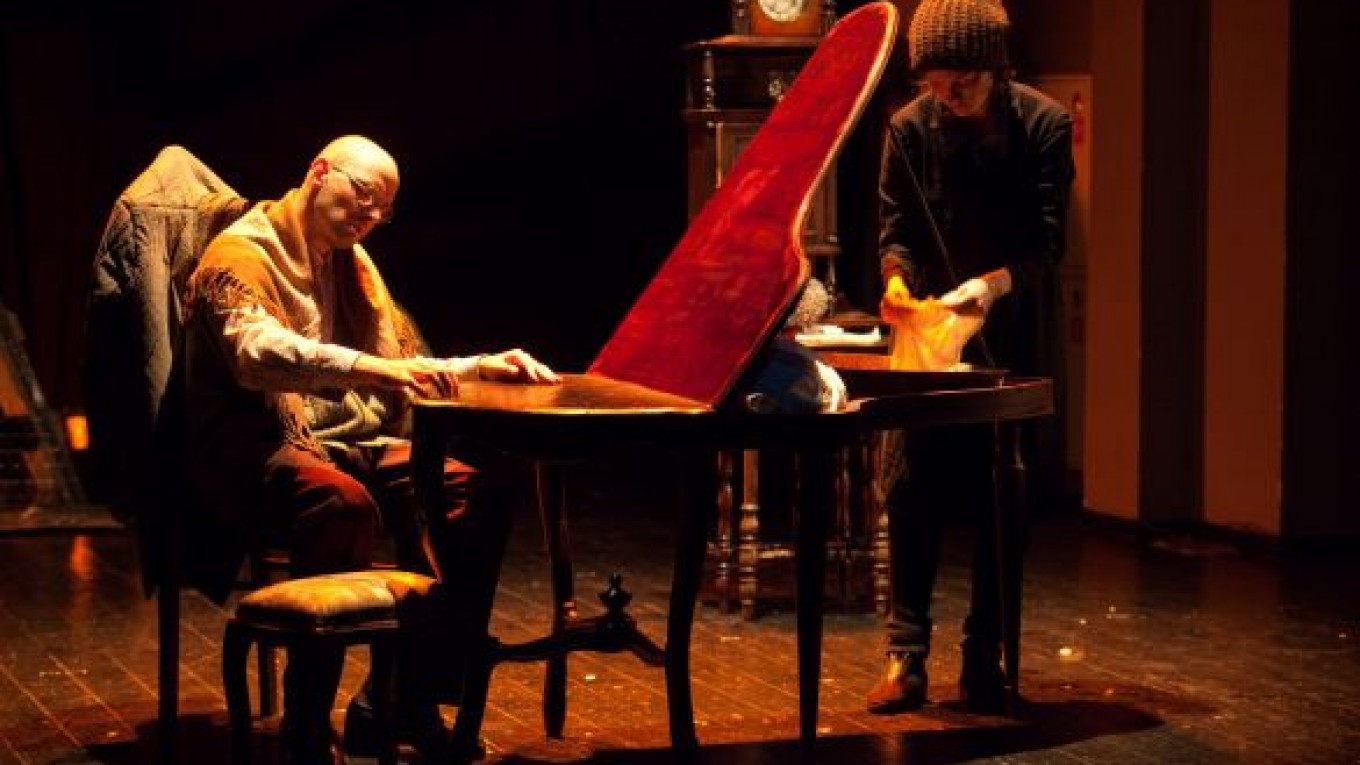If anyone were going to write a play about cannibalism, it would be Yury Klavdiyev.
Klavdiyev is one of Russia’s most distinctive and challenging voices. His plays (“I Am the Machine Gunner”) and screenplays (“Everybody Dies But Me”) take on hard topics of violence, deviance and outcasts. What might not be clear immediately is the dry-eyed affection this writer holds for his characters. More obvious, although it can be overlooked, too, is the fact that time and again Klavdiyev assumes a child’s point of view in his work. Children, often pre-teens, are almost always a focal point, or at least a prominent aspect of his work.
As Klavdiyev tells it in the program for “The Ruins” at the Playwright and Director Center, the idea for the play was suggested by Mikhail Ugarov, the playwright-director who founded Teatr.doc and now is artistic director at the Playwright and Director Center. It makes perfect sense. Who else could find nuances, paradoxes and unexpected meaning in a tale like this? Only Klavdiyev.
“The Ruins” tells the story of two families during the Leningrad Blockade. One consists of young Anechka and her father Irakly, a proper and mild-
mannered intellectual. The other is a raggedy group made up of three wild kids and their mother Maria Ruins, a simple woman who looks after the crumbling building that both families inhabit.
The families share virtually nothing. Irakly is a native of Leningrad; the Ruins are bumpkins from the country. Irakly is a scholar; Maria is uneducated. Irakly and his daughter are so weak from starvation that they can barely climb the stairs to their apartment. Maria’s children correspond to anyone’s stereotype of young people — they are loud, rambunctious and full of energy.
It is this latter discrepancy that points to the “dark secret” at the heart of “The Ruins.” Maria sends her children out to scavenge for dead bodies, and she feeds them the meat they bring home.
By reporting this information, I reveal nothing that Klavdiyev himself does not reveal quickly. His is not a “horror play” or a detective story. He has much bigger — if you will pardon the sick pun — bones to pick.
“The Ruins” presents a contrasting portrait of two ways of life. Irakly is devastated by the realization that his neighbor has fed human flesh to him and his daughter. He is the proud possessor of all kinds of moral convictions that support his angry revulsion. Maria is astonished that a man whose daughter might starve to death could possibly and so easily rationalize away her life and his own.
This, then, is an exploration of contrasting life philosophies. Does one attempt to impose one’s system of morals on life, even when life is defying and mocking every rule you have ever honored? Or does one accept that life is a messy affair that changes by day and by hour, and which tosses out new, seemingly insurmountable, challenges at every turn? Do you remain rigid and let life run you over, or do you bend with the blows and participate in the life that fate has dealt you?
These are big, crushing questions. Over the millennia they have brought down kings, queens and empires, to say nothing of countless artists and other mere mortals.
Klavdiyev himself is not taking sides.
His scholar, as played by Andrei Oganyan, appeals deeply to our sense of right and wrong and to our understanding of what it means to be civilized. As played by Irina Denisova, Maria is an extraordinary whirlwind of life energy, an unstoppable force, an endless fount of wisdom and no little wit. We watch the two in action and realize that, yes, these are two ways of approaching life. Can we — must we — choose between them, as these individuals must make unthinkable choices themselves?
Director Kirill Vytoptov opens the show with a lovely little detail. A cheery Maria Ruins greets each spectator as a visitor in her home and insists that everyone wipe his or her feet on a doormat. This is a clean home with children living in it — we do not want any dirt brought in here from outside.
Designer Nana Abdrashitova used empty space and a few items of furniture — fine old chairs and a folding table — to suggest the culture of old Leningrad and the privation of war.
Klavdiyev’s “The Ruins” can be a jarring, unfriendly play. It is also funny, thought-provoking and unflinching in its search for elusive truth.
“The Ruins” (Razvaliny) plays Nov. 24 and 25 at 8 p.m. at the Playwright and Director Center, located at 5 Begovaya Ulitsa. Metro Begovaya. Tel. 945-3245, 248-0254. . Running time: 1 hour, 35 minutes.
A Message from The Moscow Times:
Dear readers,
We are facing unprecedented challenges. Russia's Prosecutor General's Office has designated The Moscow Times as an "undesirable" organization, criminalizing our work and putting our staff at risk of prosecution. This follows our earlier unjust labeling as a "foreign agent."
These actions are direct attempts to silence independent journalism in Russia. The authorities claim our work "discredits the decisions of the Russian leadership." We see things differently: we strive to provide accurate, unbiased reporting on Russia.
We, the journalists of The Moscow Times, refuse to be silenced. But to continue our work, we need your help.
Your support, no matter how small, makes a world of difference. If you can, please support us monthly starting from just $2. It's quick to set up, and every contribution makes a significant impact.
By supporting The Moscow Times, you're defending open, independent journalism in the face of repression. Thank you for standing with us.
Remind me later.







